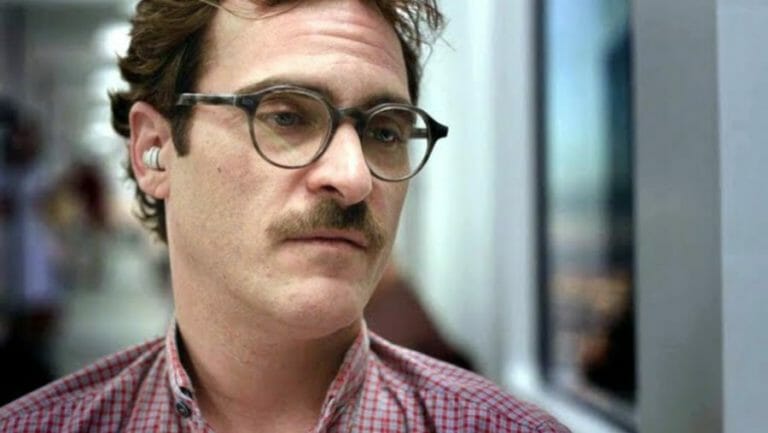By Meredith Alloway · October 17, 2013

There’s an ethos, a universal longing, within us all. Whatever form it may take, whatever satisfaction it seeks, it’s undeniable. Spike Jonze taps into this with spectacular clarity and elegance in Her.
The director’s fourth feature screened at the Hamptons International Film Festival this past week to an interesting audience. A melting pot of older patrons, young filmmakers and Hampton locals, the film had the challenge of connecting with them all. When Spike Jonze took the stage afterwards for a Q&A, what happened was intriguing.
When an audience member asked about the message he was sending with his movie, he flipped the question. Jonze was more interested in hearing what the inquirer thought. For the next few minutes, Jonze took the opportunity to let his viewers express their interpretations, instead of revealing the ones he had himself. The Q&A was a metaphor for the film as a whole. By allowing a love affair to exist between a man and his computer, the audience can superimpose their own romantic ideas onto the relationship. The computer is an intangible essence essentially, which Jonze encourages us to define.
Joaquin Phoenix is endearing and hilarious as Theodore. He’s amidst a nasty divorce, recovering from the experience of loving bliss crumbling into plaguing memories. His soon to be ex-wife Catherine, played by an always-poignant Rooney Mara, has yet to sign the divorce papers. It doesn’t help that Theodore is a love letter writer, constantly being reminded of what he had and lost.
Things change when Theodore buys a new Operating System. The computer caters towards his every need, personally, financially, economically and eventually emotionally. Samantha is her name. The silky, witty and raspy voice of Scarlett Johansson is all that humanizes the OS. Theodore is quick to appreciate her efficiency and soon enough, begins to fall for her. One night, they sleep together. Yes, I said it…they have sex.
He becomes infatuated with Samantha and she with him. But Theodore finds human companionship in his neighbor Amy (Amy Adams). She’s also just separated from her husband and has found solace in an OS. The two bond over how ridiculous it sounds to find a friend in an OS, let alone Theodore finding a girlfriend! But Amy deflects anyone’s negative opinions; she’s purely seeking joy.
As in all love stories, things do get complicated. After all, Samantha isn’t a real person. She begs to differ, constantly discussing her excitement with life and discovering new ways to make her feel human. It’s charming and all, but Theodore soon questions dating a person who doesn’t actually exist.
Jonze allows the audience to buckle up right next to Theodore and ride out the strange love affair. At times it seems wonderfully touchable and others incredibly impossible. Jonze has created a whole new world around his characters as well, transporting them to a place in the future where the hues of color are skewed and men wear high waist pants like the 1940s. Theodore even plays a video game where a little marshmallow man can be maneuvered with a laugh or a quip. I might add that this is perhaps the most hilarious part of the movie. Jonze’s Jackass humor is at its finest.
These humorous moments balance so perfectly with the deep longing and heartbreak that fills in the rest of the movie. What is ethos? How do we recover from romantic calamity? What are we all seeking and is it crazy to find it in an unlikely partner? As Amy describes it eloquently, that love is the social acceptance of insanity.
Jonze encourages us to go to that insane place, the Arcade Fire score and production design by K.K. Barrett all bringing it to fruition. When the credits rolled, I was happy to see some fellow journalists with wet eyes and dumbfounded faces. Jonze would probably snicker, satisfied that he had created a movie about much more than just a man and his computer.